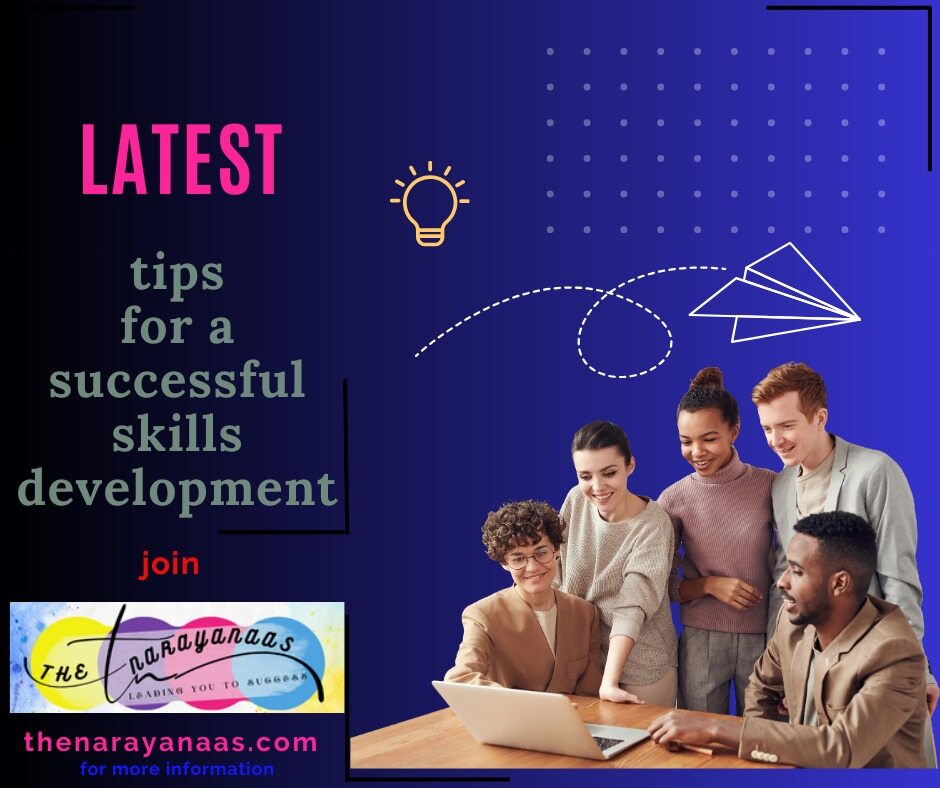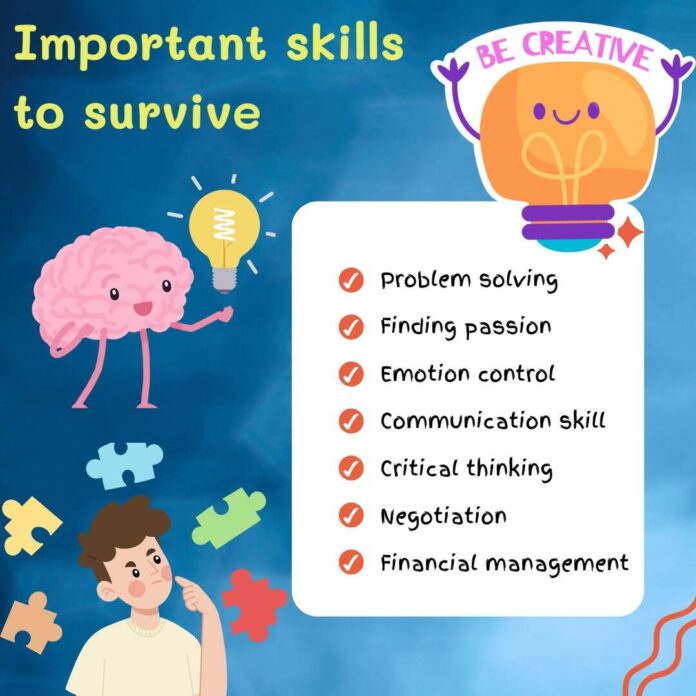As firms adjust to global interconnection, technology improvements, and changing customer expectations, below explained competencies/skills are becoming more and more valuable. In today’s competitive environment, acquiring and improving these abilities can improve employment chances and support both personal and professional progress.
The Latest Trending Self Skills

In order to assist students thrive in life, we as educators are providing them with the fundamental Trending Skills in a dynamic and expanding global economy. We make an effort to get the students ready for the twenty-first century.
These days, learners are sophisticated, tech-savvy, and highly motivated people who are always looking to challenge, inspire, question, and create.
Education should include students’ intellectual, emotional, social, and personal requirements in addition to being confined to the textbook. In current era of information, learners ought to be able to think and operate with the following abilities.
What are the trending self skills needed today???? Let’s understand……
Consider, Be thoughtful, reflect, communicate, balance, inquire, connect, take risks, manage oneself, contribute, participate, solve problems, make decisions, Critical Thinking, Adaptable, Launch, Understand, Imagination, Utilize, Truthful, Effective, Innovative
Learning Skills:
Critical Thinking: The capacity to reason logically and impartially while analyzing and assessing data or circumstances is known as critical thinking. It entails challenging presumptions, recognizing biases, evaluating the available data, and drawing well-founded conclusions. Among the essential elements of critical thinking are:
Observation: Taking note of and identifying pertinent things.
Analyzing: Dividing complicated data into more manageable chunks.
Inference: Making sense of the data and coming to logical conclusions.
Evaluation: Determining the veracity and applicability of data.
Finding solutions to problems using logical thinking is called problem-solving.
Reflection: The process of continuously analyzing and improving mental models.
Gaining the ability to think critically improves decision-making and problem-solving skills, which are essential for success in both the personal and professional spheres.
Cooperation: Working together to achieve a common objective while putting a strong emphasis on effective communication, teamwork, and mutual support is called cooperation. Important facets of collaboration consist of:
Communication is the open and transparent exchange of ideas and information.
Respect: Appreciating the many viewpoints and contributions.
Building and preserving mutual trust in one another’s skills and motivations is known as trust.
Accountability: Realizing and carrying out personal responsibilities.
Constructive dispute resolution involves addressing and resolving differences.
Collaboration is the process of pooling resources and efforts to accomplish common goals.
Teams are able to do more as a group than as individuals when there is effective cooperation, which creates a positive and productive environment.
Effective communication: The capacity to communicate ideas succinctly and effectively ensures that the message is comprehended and accepted as intended. Important components consist of:
Clarity: To prevent misconceptions, speak in a clear and succinct manner.
Active Listening: Give it your all, express interest, and react correctly.
Nonverbal Cues: To further emphasize your point, make gestures, facial expressions, and body language.
Feedback: To make sure you understand, give and request constructive criticism.
Empathy: Recognize and take into account the feelings and viewpoints of others.
Adaptability: Adjust the message to the situation and the audience.
Gaining proficiency in effective communication strengthens bonds, encourages collaboration, and advances decision-making and problem-solving skills.
Creativity: The capacity to think outside of the box and come up with novel and inventive concepts, answers, or methods is what is known as creativity. Important facets of creativity consist of:
Imagination: The ability to visualize ideas and possibilities that are not yet real.
Curiosity: The pursuit of novel insights, understandings, and encounters.
Innovation: Using original ideas to create cutting-edge products or solutions.
Being adaptable and willing to change are qualities of flexibility.
Risk-taking: The readiness to try new things and maybe fail when pursuing innovation.
Collaboration is the process of combining different ideas and points of view with others.
Enhancing creativity fosters invention, improves problem-solving skills, and produces more distinctive and successful results in both personal and professional undertakings.
Life Skills:
Ethics Action Accountability: Three interrelated principles—ethics, action, and accountability—direct responsible behavior in both personal and professional contexts:
Ethics: Describes the moral precepts that direct a person’s actions or the course of a task. It entails making choices based on moral principles including justice, fairness, honesty, and respect for other people.
Action: entails carrying out choices or actions in accordance with moral standards. It calls on people to convert their moral convictions into concrete deeds that are consistent with their obligations and values.
The duty to take ownership of one’s choices, actions, and outcomes is known as accountability. It entails taking responsibility for one’s actions and holding others, especially organizations, society, and stakeholders, accountable.
Combination:
Ethics in Action: Behaving ethically entails making decisions and acting in ways that are consistent with moral ideals. Honesty in communication, equity in decision-making, and respect for diversity are a few examples of this.
In ethics, accountability refers to accepting responsibility for one’s acts and their results, whether favorable and unfavorable. It entails openness, owning up to errors, and growing from them.
Impact: Relationships in both the personal and professional spheres are strengthened when ethics and responsibility are practiced. It fosters a positive corporate culture and long-term results that are advantageous to both people and communities.
People preserve integrity and participate in moral decision-making processes in a variety of circumstances by incorporating ethics into their actions and taking responsibility for their choices and the results of those choices. It entails taking responsibility for one’s actions and holding others, especially organizations, society, and stakeholders, accountable.
Literacy Skills:
The capacity to read, write, comprehend, and communicate successfully in a variety of circumstances is referred to as literacy abilities. Important elements consist of:
Reading: Deciphering written material, extrapolating significance, and gathering pertinent data.
Writing is the act of putting thoughts, ideas, and information into a clear, coherent written form.
Actively listening involves taking in spoken words, picking up on subtleties, and processing information.
Speaking: Using oral communication to efficiently and clearly convey thoughts, views, and facts.
Critical thinking is the process of analyzing data, assessing claims, and reaching well-reasoned conclusions.
Digital literacy is the ability to successfully navigate, assess, and use information in online and digital media.
Information literacy is the ability to assess and use data from a variety of sources to solve issues and come to wise judgments.
Understanding and assessing media messages critically, taking into account their impact, bias, and goal, is known as media literacy.
Increasing one’s reading level helps one communicate more effectively, encourages lifelong learning, and gives one the ability to fully engage in society and the workforce.
What are latest trending skills?
Critical thinking, Decision making, Analyzing, Tech-savvy….
What are Learning Skills?
Critical thinking, Collaboration, Communication, Creativity….


[…] a morning journaling is a habit that can change your life. This easy-to-follow but effective habit can increase productivity, promote greater self-awareness, […]
[…] financial stability when your income varies from month to month, budgeting calls for a distinct set of tactics. We’ll look at the top budgeting techniques for properly handling erratic income in this […]